Global Climate Initiative Backs Solar Mini-Grids to Tackle Nigeria’s Power Crisis

Nigeria, Africa’s largest economy and most populous nation has long grappled with chronic electricity shortages, but a new global initiative may offer a promising solution.
According to a recent report by Bloomberg, the Global Energy Alliance for People and Planet (GEAPP)—backed by the Rockefeller Foundation, the Bezos Earth Fund, and the Ikea Foundation—is set to make substantial investments in Nigeria’s energy sector. The initiative’s focus is on deploying solar-powered mini-grids, aimed at alleviating the country’s long-standing power shortages.
The pilot phase of the initiative is already showing success. In December 2021, GEAPP launched its first interconnected solar mini-grid, designed to provide a more reliable power source by supplementing Nigeria’s erratic national grid. These decentralized energy systems harness solar power to generate electricity locally, ensuring businesses and households continue operating even during frequent outages.
The Alliance is now expanding its efforts. Two more mini-grids are under construction, with funding secured for a fourth, Bloomberg reports. The goal is to scale these projects across the country, offering a viable alternative to Nigeria’s overburdened national grid.
Muhammad Wakil, GEAPP’s country delivery lead, emphasized the importance of these projects, stating, “We need hundreds or thousands of these kinds of projects across Nigeria to end energy poverty. We have shown it’s a viable business model,” Wakil told Bloomberg from one of the project sites in Ogun State.
Nigeria’s electricity crisis is severe and multifaceted. Despite its abundant natural energy resources, the country’s national grid currently supplies only around 4,000 megawatts—an insufficient amount for its population of 230 million people. In comparison, South Africa, with a population just a quarter the size of Nigeria’s, generates six times more electricity. As a result, Nigeria has the largest number of people globally without access to electricity—about 86 million, according to figures from the International Energy Agency (IEA) and the United Nations (UN).
The fragility of Nigeria’s power infrastructure has been starkly demonstrated in recent weeks. Within just one week, the national grid collapsed three times, leaving millions without power. Bloomberg highlights that the instability of the grid is largely due to its reliance on a small number of power plants—only nine out of 22 contribute 80% of the electricity generated. This over-dependence on a few plants, coupled with inefficiencies in energy distribution, underscores the pressing need for decentralized solutions like solar mini-grids.
In addition to deploying mini-grids, GEAPP is also addressing the financial barriers to renewable energy development through its Demand Aggregation for Renewable Technology (DART) program. The DART program pools the needs of multiple developers to negotiate better prices for solar equipment, and it operates a USD 25 M financing facility that allows developers to import equipment in U.S. dollars while repaying loans in Nigerian naira when their projects start generating revenue. This financial model aims to make renewable energy projects more viable and scalable.
The initiative’s success has attracted global attention. The World Bank, recognizing the potential of the GEAPP model, has pledged USD 130 M to fund similar solar mini-grid projects across Nigeria. This influx of capital could significantly accelerate the deployment of decentralized energy systems, providing much-needed relief to Nigeria’s overburdened national grid.
By leveraging renewable energy and innovative financial strategies, GEAPP aims to tackle Nigeria’s entrenched power crisis. As the country continues to struggle with an aging grid and unreliable power plants, decentralized solar mini-grids could provide the stability and scalability needed to bring sustainable electricity to millions of Nigerians, while reducing the country’s dependence on fossil fuels. If successful, this model could serve as a blueprint for other energy-poor nations across Africa and beyond.